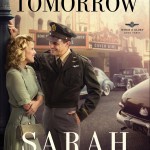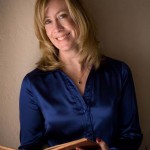Besides the cute clothes and men in uniform? First of all, there are so many dramatic stories and settings—a novelist’s dream. This was a time when ordinary men had to do extraordinary things, and when women first explored non-traditional roles while remaining ladies.
I love how your descriptions of military missions, procedure and protocol are detailed and realistic. Where did you begin with your research?
That was challenging since I’m not a pilot and didn’t serve in the military. I started general, with a wonderful oral history of the US Eighth Air Force. Then I read more specific books about the Eighth and about B-17s and about life on a bomber base. Since I wanted to get the flying scenes right, I read a “How to Fly a Plane” book to get the basics, purchased copies of the actual B-17 pilot’s manual and the training film (pure gold!), and ran the flying scenes past a pilot friend.
What was your most enjoyable research experience?
Almost all of it. I wasn’t looking forward to poring over the Antioch Ledger on the microfiche machine, but it was fascinating. I never thought I’d enjoy researching B-17 bombers, but I did. Every year I visit my local airport when the B-17s come to visit, and I was able to walk through. When you crawl through the narrow passageways, duck through the doorways, and poke your head into the top turret—and then imagine doing it as a full-grown man with heavy high-altitude flying gear in subzero temperatures under fighter attack—it gives you a new level of appreciation for what the airmen went through. And this May I was privileged to take a flight in B-17 Aluminum Overcast owned by the Experimental Aircraft Association. Technically it wasn’t research since the whole trilogy was complete, but I was thrilled that I’d gotten the details right—and it was a rollicking good ride.
Did your debut novel grow out of your research or did you have the story in your head before you began researching?
The story came first. I had a concept of a love story between a woman on the Home Front and a pilot. Then when I saw a History Channel special about the US Eighth Air Force based in England in World War II, I had my connection. My great-uncle was a B-17 pilot with the Eighth Air Force, so I had access to his letters and stories. Plus, I loved England as a setting. If I’d known how much research I’d have to do, I probably wouldn’t have started. But the more I researched, the more I became enthralled with what our airmen did during the war, so that and the story drove me.
Do you research completely then write your story, or do you write and check on facts as you go?
I wrote most of the Wings of Glory series before I had a publishing contract, so I did all my research before I started each book. Occasionally I stopped to look up new facts, but mostly I just had to check my notes or reference books. However, I’m writing my next series under deadline and have had to change my process. I did enough research before starting the series to make sure the stories worked, but I’m doing most of my research as I go.
What is a typical writing day like for you? Is it difficult to juggle job, family and writing time?
I only work one day a week, so that helps. As for writing, I do the bulk of my work when the children are in school, then while the kids do homework, I do emails and other on-line work. I’ve also become expert at using snippets of “wasted” time—I can take care of a lot of editing and emails during the kids’ soccer practices and in the dentist’s waiting room.
Your series, Wings of Glory, features three brothers. Walt Novak in A DISTANT MELODY, Jack Novak in A MEMORY BETWEEN US, and Ray Novak in the BLUE SKIES TOMORROW. When did you know you wanted to feature each brother in his own novel?
A Distant Melody was originally meant to be a standalone novel. That novel runs from mid-1942 to mid-1943, which was a dark time for the US Eighth Air Force. As I became more engrossed with the Eighth, I wanted to tell the complete story through to Victory in Europe. Since the hero had two brothers who were pilots, I realized they could “tag-team” each other—and I had a trilogy.
You will be teaching a workshop on research for the American Fiction Writer’s Conference next month in September. Can you give us a favorite tip for research as a preview?
Take very careful notes, well referenced. I go back to seventh grade when Miss Morris taught me how to research the Big Report. I keep a bibliography with each book and website getting a number. As I take notes, I include the book number and the page number. Really basic, but it saves me gobs of time. I think I’ll always remember where I read that great description of the pilot’s throat microphone or a picture of my heroine’s uniform—but I forget. This also makes it really simple when my editor checks my facts. I can easily go back and find the reference.
Your main characters are Christians who struggle with their faith in ways that we all do, but in circumstances most of us will never experience. You portray the grittiness of war in a realistic way without offending either our sensibilities or our senses. How difficult was that?
Not too bad. The accounts I read were gritty with the violence and foul language you’d expect from men at war. In my mind I know exactly what my characters said—I went to public school and university :o) Then I just wrote around it. “He left a trail of profanity in his wake,” “He used every cuss word in his considerable vocabulary,” “He swore—and not like a rookie.” You get the feel of it without getting your eyes and ears blistered.
How was the Mount Hermon Conference part of your journey to publication?
The Mount Hermon Christian Writers Conference was vital to my development as a writer. I started attending in 2003 and have only missed one year since. I learned so much about writing from fabulous teachers like Lauraine Snelling, Davis Bunn, Randall Ingermanson, Brandilyn Collins, and Angela Hunt. I learned how to approach editors and agents, and got to know them as human beings. I submitted for the first time in 2003 and kept on submitting even though no one wanted historicals for about five years. Those “rejection letter years” were hard, but the friends I made at Mount Hermon encouraged me. In 2008 the market flipped and the publishers were looking for historicals again. That year at Mount Hermon, I submitted to Vicki Crumpton from Revell and had a really nice appointment with her. She invited me to submit my proposal, and then my full manuscript. In September of that year, Revell offered me a three-book contract. Mount Hermon remains a vital part of my life as a writer. Every year I continue to learn, and now I have the opportunity to give back through encouragement, prayer, and advising first-timers.
Do you have something you would like to tell us, that no one has ever asked you?
I’m laughing. I thought no unasked interview questions remained, but you managed to ask me oodles of new questions. Thanks! It was a lot of fun.
Thank you, Sarah! I loved having you over and thanks to everyone that joined us! I will have more on Sarah on Friday’s Favorites as I review her latest, BLUE SKIES TOMORROW, the third in her Wings of Glory trilogy! 



Comments 12
It’s been fun! Thank you soooo much, Sarah!
Thanks, everyone! I’m honored that you’re interested! We get to make that connection for someone else.
We get to make that connection for someone else.
Naomi M. – isn’t that funny? I gained some insight watching my daughter. My husband and two boys and I love watching History Channel, Military Channel, all that. Daughter used to roll her eyes and leave the room. Then one day I caught her watching History Channel, transfixed. It was a documentary on Anne Frank. A PERSON. My boys can read about battles and armies and guns; my daughter needs people and relationships and stories. That’s probably what made history dry for both you and me – we needed the human touch. And that’s probably why we both like writing historical fiction
I just won Sarah’s book on another blog, but I wanted to stop by and read the interview. Sarah, it sounds like we have a very similar background when it comes to our love/hate early relationship with history. When I graduated from high school I thought I hated history because they managed to make it so… dry. When I started reading historical novels, I discovered I LOVED it. I just needed a way to relate to it. Now historical fiction is my reading/writing passion. Great interview!
Naomi
Thanks for sharing the interview, Rebecca. I’ve read only a few historicals and never thought I’d enjoy them as much as I did. Best of luck to you, Sarah, in your future books!
Sounds like the kind of book I love to read. Must add it to my TBR list.
Thanks for the interview, Rebecca! Sarah sure seems to do a lot of research!
Robin – thanks I’m so excited that you’re writing historical fiction. I’m sure you’ll do an awesome job of it!
I’m so excited that you’re writing historical fiction. I’m sure you’ll do an awesome job of it!
Robin – I love research, too! And Sarah’s research methods are as awsome as her books!
I so agree, Keli! Sarah’s tales of love and honor are hard to put down! She has a permanent spot on my bookshelf – one I’ll keep coming back to!
Sarah – I’m so thrilled to have you stop by!!
Awesome interview! I love Sarah. I have read all of her books and I might just be her biggest fan! In beginning my first historical novel I am digging into research. At first I didn’t think I would enjoy this part, but I am loving it! Thank you, Sarah, for paving the way for those of us who dream of writing historical fiction.
Blessings, Robin
Thanks for having me, Rebecca! And hi, Keli!!!
I’m a huge fan of Sarah’s work and consider her one of my must-read authors. She’s a masterful storyteller. I savored each of the three books in her Wings of Glory series and am looking forward to the next series.